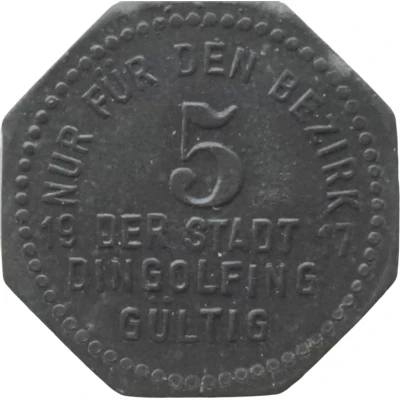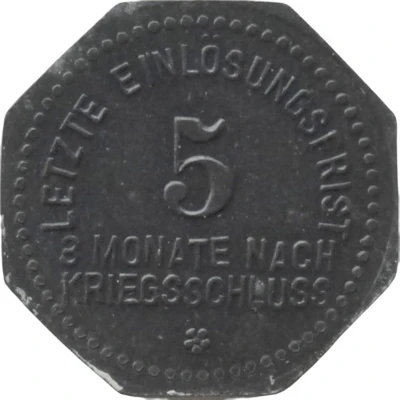


© Willem63 (CC BY-NC-SA)
5 Pfennigs - Dingolfing
1917 year| Zinc | 1.8 g | 19.2 mm |
| Issuer | City of Dingolfing (Federal state of Bavaria) |
|---|---|
| Emperor | William II (Wilhelm II) (1888-1918) |
| Type | Standard circulation coin |
| Year | 1917 |
| Value | 5 Pfennigs (5 Pfennige) (0.05) |
| Currency | Mark (1914-1924) |
| Composition | Zinc |
| Weight | 1.8 g |
| Diameter | 19.2 mm |
| Thickness | 1.1 mm |
| Shape | Octagonal (8-sided) |
| Technique | Milled |
| Orientation | Medal alignment ↑↑ |
| Demonetized | Yes |
| Updated | 2024-10-04 |
| Numista | N#338608 |
|---|---|
| Rarity index | 95% |
Reverse
Pearl rim, legend surrounding above denomination and below.
Script: Latin
Lettering:
LETZTE EINLÖSUNGSFRIST
5
3 MONATE NACH
KRIEGSSCHLUSS
Edge
Plain
Interesting fact
The 5 Pfennigs - Dingolfing 1917 coin was minted during a time of economic turmoil in Germany, known as the "Inflationary Period" (1914-1923), when the value of the German mark dropped significantly due to excessive printing of money to finance World War I and other economic factors. As a result, many everyday items, including coins, were made of cheaper materials like zinc instead of traditional metals like copper or silver. This coin's composition of zinc was a departure from the standard copper or silver coins minted in previous years, reflecting the economic challenges of the time.